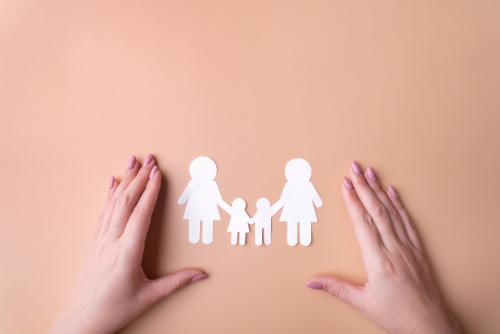Female same-sex parents and parental responsibility
The number of same-sex couples who jointly raise and parent a child together is rising. In 2019, according to the Office for National Statistics, there were 212,000 same-sex families in the UK, up by 40% from 2015.
However, when it comes to the law, it's not always straightforward for same-sex couples because being a legal parent and having parental responsibility are not always the same thing.
The law changed in 2009 and this blog relates to children conceived after 6 April in that year.
What exactly is parental responsibility?
Parental responsibility is all the duties and obligations you have towards a child as a parent.
This covers everything from food, shelter, safety and financial provision as well as education, religion, discipline, medical treatment, the name by which the child should be known and where they should live.
If you have parental responsibility, you are allowed to make or share in important decisions affecting your child's upbringing.
Who has automatic parental responsibility in a female same-sex partnership?
Regardless of the way in which the child is conceived, the woman giving birth will always be a legal parent with parental responsibility.
What if you're married or in a civil partnership?
If your child is conceived by artificial insemination, you will both be legal parents and have parental responsibility, unless you did not consent.
The biological father will have no legal status whether he is known to the couple or not.
If the child is conceived by having sex, the non-birth mother will not be a legal parent or have parental responsibility. The biological father would be the other legal parent and could have parental responsibility if named on the birth certificate.
What if you're not married or in a civil partnership?
Your rights here depend very much on how the child is conceived.
- Artificial insemination or IVF: Provided you both consent and the treatment takes place at a UK licensed clinic, the woman not giving birth is a legal parent but doesn't automatically have parental responsibility. She will acquire parental responsibility if named on the birth certificate. The biological father has no legal status whether he is known to the couple or not.
- Donor sperm: If the child is conceived using donor sperm in a private arrangement but still by artificial insemination, the woman not giving birth will be neither a legal parent nor have parental responsibility. The biological father would be the legal parent and could also have parental responsibility if named on the birth certificate.
- Sexual intercourse: If a child is conceived by having sex with a man, the woman not giving birth will not be a legal parent or have parental responsibility. The father will be a legal parent and could also have parental responsibility if he is named on the birth certificate.
Can I obtain parental responsibility?
Yes, a legal parent can acquire parental responsibility by being registered on the birth certificate.
Legal parents can also acquire parental responsibility by entering into a parental responsibility agreement or by court order.
Parents who don't fall within the category of legal parent may still be able to acquire parental responsibility by agreement or court order. We can advise you depending on your situation.
How we can help
Of course, being a parent is much more than the legal position. The relationship a child has with its parents is an emotional and psychological one. Even if you aren't a legal parent or have parental responsibility, your relationship with the child is important.
Whether you are in a relationship or have separated we can advise you about your legal status and whether you should acquire parental responsibility. We also work closely with our Wills and Probate team to make sure that you and your family are protected in the future.
When a relationship ends, we can advise and support you in making arrangements for your children by agreement. Where this isn't possible, we can advise and represent you in connection with court proceedings.
Get in touch
Contact any member of our Family Law and Divorce team for help and more information.


